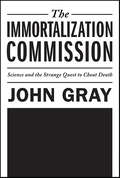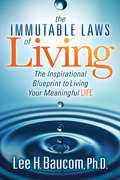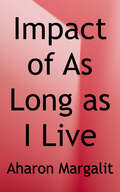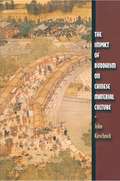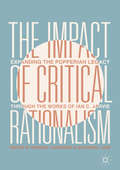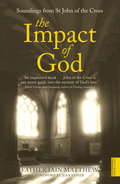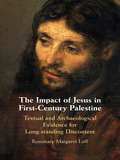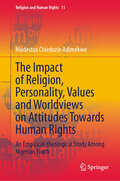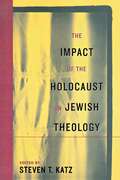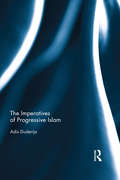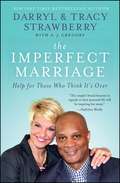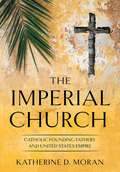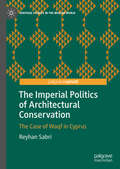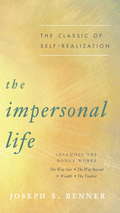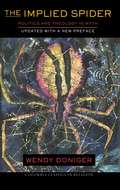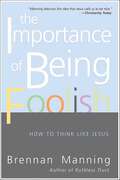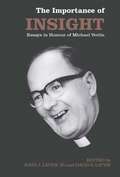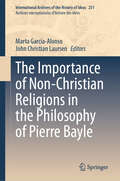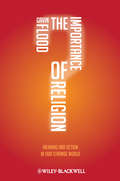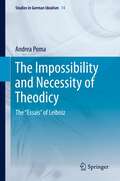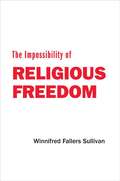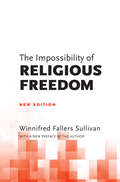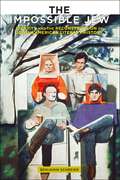- Table View
- List View
The Immortalization Commission: Science and the Strange Quest to Cheat Death
by John GrayA Globe and Mail Best Books of the Year 2011 TitleAt the heart of human experience lies an obsession with the nature of death. Religion, for most of history, has provided an explanation for human life and a vision of what comes after it. But in the late nineteenth and early twentieth centuries, such beliefs came under relentless pressure as new ideas—from psychiatry to evolution to communism—seemed to suggest that our fate was now in our own hands: humans could cease to be animals, defeat death, and become immortal.In The Immortalization Commission, the acclaimed political philosopher and critic John Gray takes a brilliant and frightening look at humankind's dangerous striving toward a scientific version of immortality. Probing the parallel faiths of Bolshevik "God-builders," who sought to reshape the planet and psychical researchers, who believed they had evidence of a nonreligious form of life after death, Gray raises fascinating questions about how such beliefs threaten the very nature of what it means to be human. He looks to philosophers, journalists, politicians, charlatans, and mass murderers who all felt driven by a specifically scientific and modern worldview and whose revolt against death resulted in a series of experiments that ravaged whole countries. An urgent examination of Darwin's post-religious legacy, The Immortalization Commission is an important work from "one of Britain's leading public intellectuals" (The Wall Street Journal).
The Immutable Laws of Living: The Inspirational Blueprint to Living Your Meaningful Life
by Lee H. BaucomWhat if there are some rules to living? What if these &“laws&” are frequently broken? In fact, you probably are breaking some of them right now.Anyone struggling or feeling stuck in life is breaking at least one of these laws. Just like gravity, these laws affect every person, whether that person understands them or not. Instead of breaking the laws (even without realizing it), readers discover how to obey the laws. They learn how to get &“unstuck,&” find success without chasing it, and finally, obtain peace.The Immutable Laws of Living helps readers understand:Why life isn&’t fair, and why that isn&’t the problem.How to deal with life challenges, and come out ahead.How your thoughts keep you stuck, and how to free yourself.Why fighting change won&’t work, and why you don&’t have to.How to deal with your fears and get them to help you.How to make a real and lasting impact.If you believe there are hidden rules or laws to living a great life, there are. And you can learn them for yourself. Follow the laws and learn to thrive!
The Impact of As Long As I Live
by Aharon MargalitThis is a book about heroes about people who chose to truly live. After publishing As Long as I Live, Rabbi Aharon Margalit met dozens of people facing difficult challenges who related that his book had impacted their decision to stop wallowing in misery and instead draw on deep reserves of spiritual strength in order to choose life. <p><p>This book contains fourteen incredible stories, each one depicting a challenge and how it was overcome, followed by Tools and Insights for Life, applying the lessons from the stories to our own lives. Here are some of the heroes you will meet: Zevy, who made a personal commitment and saved his family from oblivion <p>- Moishy, who soared to the heights in his wheelchair - Chaim, who, against all odds, recuperated from a stroke <p>- Avigdor, the brave bachur who took responsibility for his mistake <p>- Yehudah, who succeeded in utilizing the final moments of his life <p><p>These are only a few of the Jews whose lives have been impacted by As Long as I Live, who have changed their attitude to life’s challenges, who, instead of being crushed by the weight of their troubles, looked for and found the reserves of strength hidden inside them and turned their difficulties and challenges into a means of personal empowerment. These stories are sure to touch you deeply and help you discover and tap into your own strengths and capabilities and transform your life.
The Impact of Buddhism on Chinese Material Culture (Buddhisms: A Princeton University Press Series #11)
by John KieschnickFrom the first century, when Buddhism entered China, the foreign religion shaped Chinese philosophy, beliefs, and ritual. At the same time, Buddhism had a profound effect on the material world of the Chinese. This wide-ranging study shows that Buddhism brought with it a vast array of objects big and small--relics treasured as parts of the body of the Buddha, prayer beads, and monastic clothing--as well as new ideas about what objects could do and how they should be treated. Kieschnick argues that even some everyday objects not ordinarily associated with Buddhism--bridges, tea, and the chair--on closer inspection turn out to have been intimately tied to Buddhist ideas and practices. Long after Buddhism ceased to be a major force in India, it continued to influence the development of material culture in China, as it does to the present day. At first glance, this seems surprising. Many Buddhist scriptures and thinkers rejected the material world or even denied its existence with great enthusiasm and sophistication. Others, however, from Buddhist philosophers to ordinary devotees, embraced objects as a means of expressing religious sentiments and doctrines. What was a sad sign of compromise and decline for some was seen as strength and versatility by others. Yielding rich insights through its innovative analysis of particular types of objects, this briskly written book is the first to systematically examine the ambivalent relationship, in the Chinese context, between Buddhism and material culture.
The Impact of Critical Rationalism: Expanding the Popperian Legacy through the Works of Ian C. Jarvie
by Raphael Sassower Nathaniel LaorAs a student and disciple of Karl Popper and longtime managing editor of Philosophy of the Social Sciences, Ian C. Jarvie extended the notion of Critical Rationalism to be useful in anthropology, aesthetics, film studies, and various social sciences. In this Festschrift, contributors from a range of interests and disciplines engage with the Popperian legacy and Jarvie’s scholarly and editorial work in Critical Rationalism to contextualize it in the broader, contemporary intellectual landscape. These original essays not only honor Jarvie’s legacy, but expand it to cross the philosophical divide between analytic and continental schools of thought. In so doing, the authors bring the state-of-the-art achievements of Critical Rationalism to the forefront of current academic debates.
The Impact of God: Soundings from St John of the Cross
by Iain MatthewSt John of the Cross testifies to a God who longs to meet us in our deepest need. Whilst rejection and imprisonment played their part in the life of this sixteenth-century Spanish friar, John's poetry and prose reveal the beauty and power of a wondrous God. It gives us courage to believe in the possibility of change in our own lives, however unlikely or impossible this may seem. Father Iain Matthew uses this classic inspirational Christian writing as his starting point, and offers five interpretations which make its richness relevant to the modern reader.
The Impact of Jesus in First-Century Palestine: Textual and Archaeological Evidence for Long-standing Discontent
by Rosemary Margaret LuffAlthough the archaeological evidence indicates a prosperous and thriving Galilee in the early first century CE, the Gospel texts suggest a society under stress, where the rich were flourishing at the expense of the poor. In this multi-disciplinary study, Rosemary Margaret Luff contributes to current debates concerning the pressures on early first-century Palestinian Jews, particularly with reference to socio-economic and religious issues. She examines Jesus within his Jewish environment in order to understand why he rose to prominence when he did, and what motivated him to persevere with his mission. Luff's study includes six carefully-constructed essays that examine Early Christian texts against the wider background of late Second Temple Judaic literature, together with the material evidence of Galilee and Judea (Jerusalem). Synthesizing a wide range of archaeological and textual data for the first time, she offers new insights into the depth of social discontent and its role in the rise of Christianity.
The Impact of Religion, Personality, Values and Worldviews on Attitudes Towards Human Rights: An Empirical-theological Study Among Nigerian Youth (Religion and Human Rights #11)
by Modestus Chiedozie AdimekweThis book provides a rigorous investigation into the adoption and culture of human rights in Nigeria, with a focus on the human rights attitudes of Nigerian students. Exploring the perceived paradox of enthusiastic endorsement of human rights instruments and their poor application in Nigeria, the author uses an empirical-theological research design to understand how young people in Nigeria evaluate human rights and which factors trigger their evaluation. In doing so, this book is the first to empirically examine the predictors of human rights attitudes among Nigerians and provides new insights into the degree of social significance of the religiosity of adolescents in the country. It also offers a compelling quantitative analysis differences in human rights attitudes among Nigerian youth along religious lines. Given the importance of a culture of human rights in our increasingly diverse societies and the salience of religion on this matter in Nigeria, and across the Africancontinent, this book provides a valuable perspective on the interrelationships between religion, value orientations, personality traits, socio-political context, and human rights. Being concerned with the future of human rights in Nigeria, the author argues that it is crucial to understand ‘the religious factor’ among Nigerian students today. This book is therefore recommended to educators, especially teachers of Religion Education, and scholars working in educational settings, but will also be of interest to researchers in social sciences, public administrators, and policymakers.
The Impact of the Holocaust on Jewish Theology
by Steven T KatzThe theological problems facing those trying to respond to the Holocaust remain monumental. Both Jewish and Christian post-Auschwitz religious thought must grapple with profound questions, from how God allowed it to happen to the nature of evil.The Impact of the Holocaust on Jewish Theology brings together a distinguished international array of senior scholars—many of whose work is available here in English for the first time—to consider key topics from the meaning of divine providence to questions of redemption to the link between the Holocaust and the creation of the State of Israel. Together, they push our thinking further about how our belief in God has changed in the wake of the Holocaust.Contributors: Yosef Achituv, Yehoyada Amir, Ester Farbstein, Gershon Greenberg, Warren Zev Harvey, Tova Ilan, Shmuel Jakobovits, Dan Michman, David Novak, Shalom Ratzabi, Michael Rosenak, Shalom Rosenberg, Eliezer Schweid, and Joseph A. Turner.
The Imperatives of Progressive Islam
by Adis DuderijaWith the proliferation of transnational Muslim networks over the last two decades, the religious authority of traditionally educated Muslim scholars, the uluma, has come under increasing scrutiny and disruption. These networks have provided a public space for multiple perspectives on Islam to be voiced, allowing "progressive" Islamic worldviews to flourish alongside more (neo)traditional outlooks. This book brings together the scholarship of leading progressive Muslim scholars, incorporating issues pertaining to politics, jurisprudence, ethics, theology, epistemology, gender and hermeneutics in the Islamic tradition. It provides a comprehensive discussion of the normative imperatives behind a progressive Muslim thought, as well as outlining its various values and aims. Presenting this emerging and distinctive school of Islamic thought in an engaging and scholarly manner, this is essential reading for any academic interested in contemporary religious thought and the development of modern Islam.
The Imperfect Marriage: Help for Those Who Think It's Over
by Darryl Strawberry Tracy Strawberry A J GregoryA marriage guidebook for the not-so-perfect marriage--filled with extremely candid, practical, and biblically based principles--proven to make any relationship successful.Darryl and Tracy Strawberry admit they have "made every possible mistake you can make in marriage." Together, this devoted couple has suffered through--and survived--adultery, addiction, financial destruction, and many other all-too-familiar struggles. A no-holds-barred account of their personal journey, The Imperfect Marriage provides a step-by-step program that will help you and your partner understand the key issues that could be causing damage in your relationship and recognize turning points on the journey toward marriage restoration. Darryl and Tracy Strawberry know firsthand what it takes to make it through the battle and how to come out victorious. Beginning with putting God at the center, their words will inspire you to transform your marriage into an enduring and vital relationship. The Strawberrys keep it real and preach it real. They deal with real people, real problems, and offer solutions for the present. Through candid anecdotes, a great deal of self-awareness, and a true sense of honesty, Darryl and Tracy offer the vision, encouragement, and practical advice that every healthy marriage needs in order to thrive. Whether you and your partner are looking to heal a broken relationship, or avoid the mistakes that doomed a past one, The Imperfect Marriage offers the guidance and wisdom you need to make your marriage a success.
The Imperial Church: Catholic Founding Fathers and United States Empire (The United States in the World)
by Katherine D. MoranThrough a fascinating discussion of religion's role in the rhetoric of American civilizing empire, The Imperial Church undertakes an exploration of how Catholic mission histories served as a useful reference for Americans narrating US settler colonialism on the North American continent and seeking to extend military, political, and cultural power around the world. Katherine D. Moran traces historical celebrations of Catholic missionary histories in the upper Midwest, Southern California, and the US colonial Philippines to demonstrate the improbable centrality of the Catholic missions to ostensibly Protestant imperial endeavors.Moran shows that, as the United States built its continental and global dominion and an empire of production and commerce in the Gilded Age and Progressive Era, Protestant and Catholic Americans began to celebrate Catholic imperial pasts. She demonstrates that American Protestants joined their Catholic compatriots in speaking with admiration about historical Catholic missionaries: the Jesuit Jacques Marquette in the Midwest, the Franciscan Junípero Serra in Southern California, and the Spanish friars in the Philippines. Comparing them favorably to the Puritans, Pilgrims, and the American Revolutionary generation, commemorators drew these missionaries into a cross-confessional pantheon of US national and imperial founding fathers. In the process, they cast Catholic missionaries as gentle and effective agents of conquest, uplift, and economic growth, arguing that they could serve as both origins and models for an American civilizing empire.The Imperial Church connects Catholic history and the history of US empire by demonstrating that the religious dimensions of American imperial rhetoric have been as cross-confessional as the imperial nation itself.
The Imperial Politics of Architectural Conservation: The Case of Waqf in Cyprus (Heritage Studies in the Muslim World)
by Reyhan SabriThis book documents the changing role of the Islamic Waqf institution in Cyprus and the conservation of Waqf heritage buildings of Ottoman and Western origins. Previously ignored archives of documents detailing the conservation of Waqf buildings during Ottoman and British rule allow a fine-grained analysis of the colonial introduction of Western approaches to heritage conservation. Colonial rule saw major legislative and administrative changes to the originally autonomous Ottoman Waqf institution, which had already been subject to reforms under the Ottoman regime. Under British rule, Western heritage concepts and modern architectural conservation discourses became the core conservation principles in Cyprus. Earlier centralisation attempts during the Ottoman Tanzimat (1831-1876), and the procedural, technical, and political reconfigurations during the British colonial era in Cyprus (1878-1960), were key factors of the transformation of the Waqf’s traditional building upkeep system. These imperial interventions, their orientalist mindset, and the rise of nationalism, finally led to the erosion of Waqf in Cyprus as a non-Western and sustainable form of building conservation. This study reveals how the Western approach, the forms of expertise it privileges, and pragmatic diversions from this practice for political purposes, were useful in neutralizing the legitimacy of local practices, except in cases where opportunistic ‘recognition’ of their utility played a role in inter-communal, colonial, nationalist, and inter-imperial politics.
The Impersonal Life: The Classic of Self-Realization
by Joseph S. BennerThe classic of practical mysticism is published with four bonus works in this handsome signature edition. Since it first appeared in 1914, The Impersonal Life has touched hundreds of thousands of readers. Its simple meditative message teaches you, step by step, to realize that your own consciousness is one with all of Creation—that you are an outlet of Divine will. Once that extraordinary truth is understood, your wishes become one with God, and your life unfolds in a meaningful, exuberant mosaic in which your fondest hopes and highest purposes are realized. Written anonymously by American mystic Joseph S. Benner (1872-1938), The Impersonal Life is one of the modern landmarks of New Thought and mystical spirituality As a special bonus, this edition includes four of Benner's most powerful essays: The Way Out; The Way Beyond; Wealth; and The Teacher. Here is a complete journey into the work of a spiritual genius and practical mystic.
The Implied Spider: Politics and Theology in Myth (American Lectures on the History of Religions #Vol. 16)
by Wendy DonigerWendy Doniger's foundational study is both modern in its engagement with a diverse range of religions and refreshingly classic in its transhistorical, cross-cultural approach. By responsibly analyzing patterns and themes across context, Doniger reinvigorates the comparative reading of religion, tapping into a wealth of narrative traditions, from the instructive tales of Judaism and Christianity to the moral lessons of the Bhagavad Gita. She extracts political meaning from a variety of texts while respecting the original ideas of each. A new preface confronts the difficulty of contextualizing the comparison of religions as well as controversies over choosing subjects and positioning arguments, and the text itself is expanded and updated throughout.
The Implied Spider: Politics and Theology in Myth, Updated with a new Preface
by Wendy DonigerWendy Doniger's foundational study is both modern in its engagement with a diverse range of religions and refreshingly classic in its transhistorical, cross-cultural approach. By responsibly analyzing patterns and themes across context, Doniger reinvigorates the comparative reading of religion, tapping into a wealth of narrative traditions, from the instructive tales of Judaism and Christianity to the moral lessons of the Bhagavad Gita. She extracts political meaning from a variety of texts while respecting the original ideas of each. A new preface confronts the difficulty of contextualizing the comparison of religions as well as controversies over choosing subjects and positioning arguments, and the text itself is expanded and updated throughout.
The Importance of Being Foolish: How To Think Like Jesus
by Brennan ManningIn the eyes of the world, Jesus was a fool. He did not abide by the rules of his day; the people he associated with were shunned by society; his Sermon on the Mount reads likea primer on being left behind, stepped on, and ignored. In order for us to truly be the people Jesus wants us to be, we too must learn to become "foolish."Becoming a Christian is not a magical enterprise by which we are automatically transformed into better people. We must train to become who God intends us to be. In The Importance of Being Foolish, bestselling Christian author Brennan Manning teaches us how to think like Jesus. By reorienting our lives according to the gospel we may appear to be fools in the eyes of the world, but Manning reveals that this is exactly what Jesus wants.In a powerful exploration of the mind of Christ, Manning reveals how our obsession with security, pleasure, and power prevents us from living rich and meaningful lives. Our endless struggle to acquire money, good feelings, and prestige yields a rich harvest of worry, frustration, and resentment. Manning explores what Christ's mind was truly focused on: finding the Father, compassion for others, a heart of forgiveness, and the work of the kingdom.Coming from the gentle yet compelling voice of Brennan Manning, The Importance of Being Foolish is a refreshing reminder of the radical call of Jesus and the transforming love of God.
The Importance of Being Human: Some Aspects of the Christian Doctrine of Man (Bampton Lectures in America)
by E. L. Mascall"Whatever judgement may be passed on the manner of its treatment, it will hardly be denied that the subject which I have chosen for this book--man, his nature, his end, his predicament, his resources--is of peculiar relevance at the present day, when the human race is confronted simultaneously with greater possibilities of material achievement and with greater dangers to its very existence than at any other time in its recorded history. A note of irony is added by the fact that Christian theologians themselves are far from agreement upon the basic issues, though it is to be hoped that sympathetic discussion may reveal their divergences to be less than they have sometimes thought them to be. Indeed, I am not without hope that the present book, which was originally delivered as the Bampton Lectures for 1958 at Columbia University in the City of New York, may contribute in some degree to this much to be desired rapprochement. The situation being what it is, however, it may be well to make it plain at the outset that the standpoint from which the subject is discussed is that of a Catholic theologian of the Anglican allegiance."
The Importance of Insight: Essays in Honour of Michael Vertin (The Royal Society of Canada Special Publications)
by John J Liptay David S. LiptayWritten in honour of Michael Vertin the distinguished philosopher and Lonergan scholar at the University of Toronto, The Importance of Insight brings together a number of thoughtful essays by leading Lonergan scholars. These essays investigate the importance of Lonergan's articulation of insight, and how it can be applied within the fields of cognitional theory, theology, ethics, and politics. The contributors address several issues emerging from the post-Enlightenment crisis of meaning and value, as well as more specific contemporary concerns, such as the nature of Christian revelation, the articulation of Church doctrine, and the ethical training health care professionals should receive. By indicating what there is to be gained by understanding and applying insight in a number of different contexts, this collection highlights the relevance of Lonergan's thought in the contemporary intellectual and cultural milieu, and, at the same time, makes a significant contribution to the development of Lonergan's thought itself. In this way, The Importance of Insight offers a window into cutting-edge Lonergan scholarship and some of its central concerns and preoccupations.
The Importance of Non-Christian Religions in the Philosophy of Pierre Bayle (International Archives of the History of Ideas Archives internationales d'histoire des idées #251)
by John Christian Laursen Marta García-AlonsoThis book offers a fresh perspective on early modern philosophy by highlighting Pierre Bayle's engagement with non-Christian sources. If our major political, ethical, and epistemic doctrines were solely rooted in Christian genealogies, it would seem necessary to include Christianity in the European Constitution. However, this book reveals a different story. The anthropological insights gained from encounters with other lands not only enriched the ethical and political discussions of philosophers, historians, and literati, but also paralleled the incorporation of empirical data from these regions into fields like medicine, botany, or navigation. These accounts became the building blocks for ethical and political thought, a wellspring of new ideas, thereby making the understanding of other cultures and religions pivotal in reflecting upon the specificities of Europe. Pierre Bayle's work exemplifies this transformative influence.
The Importance of Religion: Meaning and Action in our Strange World
by Gavin FloodThe Importance of Religion reveals the significance of religion in modern times, showing how it provides people with meaning to their lives and helps guide them in their everyday moral choices Provides readers with a new understanding of religion, demonstrating how in its actions, texts and world views religion is enduring and vividly engages with the mystery of the world Offers striking arguments about the relationship of religion to science, art and politics Engagingly written by a highly respected scholar of religion with an international reputation
The Impossibility and Necessity of Theodicy
by Andrea PomaThis book provides an analytical interpretation of Leibniz's 'Essais de Théodicée' with wide-ranging references to all his works. It shows and upholds many thesis: Leibniz's rational conception of faith, his rational notion of mystery, the reformation of classical ontology, and the importance of Leibniz's thought in the tradition of the critical idealism. In his endeavor to formulate a theodicy, Leibniz emerges as a classic exponent of a non-immanentist modern rationalism, capable of engaging in a close dialogue with religion and faith. This relation implies that God and reason are directly involved in posing the challenge and that the defence of one is the defence of the other. Theodicy and logodicy are two key aspects of a philosophy which is open to faith and of a faith which is able to intervene in culture and history.
The Impossibility of Religious Freedom
by Winnifred Fallers SullivanThe Constitution may guarantee it. But religious freedom in America is, in fact, impossible. So argues this timely and iconoclastic work by law and religion scholar Winnifred Sullivan. Sullivan uses as the backdrop for the book the trial of Warner vs. Boca Raton, a recent case concerning the laws that protect the free exercise of religion in America. The trial, for which the author served as an expert witness, concerned regulations banning certain memorials from a multiconfessional nondenominational cemetery in Boca Raton, Florida. The book portrays the unsuccessful struggle of Catholic, Protestant, and Jewish families in Boca Raton to preserve the practice of placing such religious artifacts as crosses and stars of David on the graves of the city-owned burial ground. Sullivan demonstrates how, during the course of the proceeding, citizens from all walks of life and religious backgrounds were harassed to define just what their religion is. She argues that their plight points up a shocking truth: religion cannot be coherently defined for the purposes of American law, because everyone has different definitions of what religion is. Indeed, while religious freedom as a political idea was arguably once a force for tolerance, it has now become a force for intolerance, she maintains. A clear-eyed look at the laws created to protect religious freedom, this vigorously argued book offers a new take on a right deemed by many to be necessary for a free democratic society. It will have broad appeal not only for religion scholars, but also for anyone interested in law and the Constitution.
The Impossibility of Religious Freedom: New Edition
by Winnifred Fallers SullivanThe Constitution may guarantee it. But religious freedom in America is, in fact, impossible. So argues this timely and iconoclastic work by law and religion scholar Winnifred Sullivan. Sullivan uses as the backdrop for the book the trial of Warner vs. Boca Raton, a recent case concerning the laws that protect the free exercise of religion in America. The trial, for which the author served as an expert witness, concerned regulations banning certain memorials from a multiconfessional nondenominational cemetery in Boca Raton, Florida. The book portrays the unsuccessful struggle of Catholic, Protestant, and Jewish families in Boca Raton to preserve the practice of placing such religious artifacts as crosses and stars of David on the graves of the city-owned burial ground. Sullivan demonstrates how, during the course of the proceeding, citizens from all walks of life and religious backgrounds were harassed to define just what their religion is. She argues that their plight points up a shocking truth: religion cannot be coherently defined for the purposes of American law, because everyone has different definitions of what religion is. Indeed, while religious freedom as a political idea was arguably once a force for tolerance, it has now become a force for intolerance, she maintains. A clear-eyed look at the laws created to protect religious freedom, this vigorously argued book offers a new take on a right deemed by many to be necessary for a free democratic society. It will have broad appeal not only for religion scholars, but also for anyone interested in law and the Constitution.Featuring a new preface by the author, The Impossibility of Religious Freedom offers a new take on a right deemed by many to be necessary for a free democratic society.
The Impossible Jew: Identity and the Reconstruction of Jewish American Literary History
by Benjamin SchreierHe destroys in order to create. In a sweeping critique of the field, Benjamin Schreier resituates Jewish Studies in order to make room for a critical study of identity and identification. Displacing the assumption that Jewish Studies is necessarily the study of Jews, this book aims to break down the walls of the academic ghetto in which the study of Jewish American literature often seems to be contained: alienated from fields like comparative ethnicity studies, American studies, and multicultural studies; suffering from the unwillingness of Jewish Studies to accept critical literary studies as a legitimate part of its project; and so often refusing itself to engage in self-critique. The Impossible Jew interrogates how the concept of identity is critically put to work by identity-based literary study. Through readings of key authors from across the canon of Jewish American literature and culture—including Abraham Cahan, the New York Intellectuals, Philip Roth, and Jonathan Safran Foer—Benjamin Schreier shows how texts resist the historicist expectation that self-evident Jewish populations are represented in and recoverable from them. Through ornate, scabrous, funny polemics, Schreier draws the lines of relation between Jewish American literary study and American studies, multiethnic studies, critical theory, and Jewish Studies formations. He maintains that a Jewish Studies beyond ethnicity is essential for a viable future of Jewish literary study.
